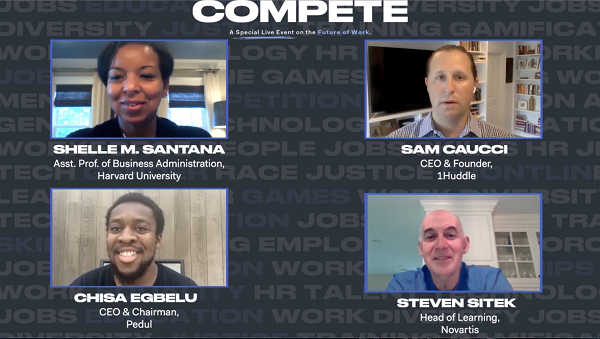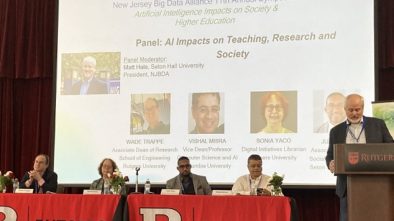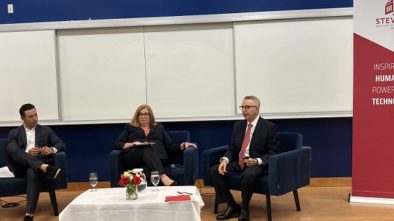Future of Work is Now, Speakers Say at COMPETE Event
During normal times, business leaders agreed that there were work trends they’d eventually have to deal with, but that would be in the future, years from now.
But then the pandemic arrived, and so did the future, forcing leaders to address some of those trends right away — remote work, the implementation of new mobile technologies, and the outsourcing of repeatable tasks.
“The future of work is no longer in the future. It is now. And we need to move faster to keep up,” said Sam Caucci, founder and CEO of 1Huddle (Newark), at a virtual event held by his company last week called “COMPETE: A Special Live Event on the Future of Work.”
“Questions are being asked about the jobs of the future. Which will be obsolete? What are the new jobs while we create an economy that engages all workers? How do we let society compete?” Caucci said. “What jobs are overvalued and what jobs are undervalued by employers? How’s tech doing? Is it making an impact on the right stuff? And what are these robots going to do and replace?”
Some 50 speakers participated in one-on-one discussions or in discussions involving three or four panelists. They included industry, social, political, community, nonprofit, entertainment and educational leaders.
The bottom line: The pandemic has taken a toll on all facets of work.
John Teza, a principal at NRD Capital (Atlanta), noted, “So much of the future of work is about automation and AI [artificial intelligence], and the impact those two forces are going to have on jobs and work environments of tomorrow. I hope in the future we see much more augmentation and not automation, and a much better human application of AI.”
Importance of Internships
Shadae McDaniel, city leader of the Newark-based All Stars Project of New Jersey, discussed the importance of access to work programs, especially internships.
“Access to internships is one of the most challenging parts of my job in that I have to both make companies aware of the need for and responsibility of investing in communities, and express to young people that there are adults who welcome and support them to participate in opportunities that exist outside of their neighborhood,” she said.
Founded in 1981, the organization has transformed the lives of tens of thousands of youth in poor communities. “We are teaching students how to adapt and learn, and encouraging play and pretend, so they have the opportunity to think differently,” she said.
“Internships are one of the most impactful experiences young people from marginalized communities can participate in. It is being in unfamiliar spaces with unfamiliar people that pushes the creation of new kinds of relationships,” she added.
“The only way we are going to create and build new futures and new work is for people who don’t agree and don’t look alike to come together, have conversations and do something new together.”
“The only way we are going to create and build new futures and new work is for people who don’t agree and don’t look alike to come together, have conversations and do something new together.”Shadae McDaniel, city leader of the Newark-based All Stars Project of New Jersey
Wagner Denuzzo, head of capabilities for future of work at Prudential Financial (Newark), said that talk about the future of work has generated a lot of questions, including about his job title.
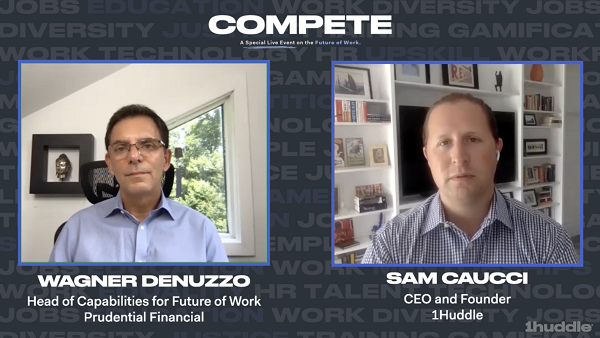
“How are we going to reinvent work? How are we going to reinvent what it means to be unemployed, and how are we going to reinvent the workplace? How do we work? Where do we work?” he asked.
Technology, robotics and automation are important issues.
“Of course, we need to automate some processes that don’t need to be done by a person, but when you think about differentiating your organization, you are going to figure it out that technology is going to be leveraged by everyone,” he said.
“The age of transparency is here. Authenticity is here. What we are really talking about is creating reality-based, data-based decision-making processes.”Wagner Denuzzo, Prudential
“What’s going to differentiate your organization will be the people who use technology on a day-to-day basis to complement each other, creating a greater value than the traditional workplace,” said Denuzzo.
“The age of transparency is here. Authenticity is here. What we are really talking about is creating reality-based, data-based decision-making processes.”
He added that Prudential “brought in artificial intelligence not to eliminate jobs, but to augment our intelligence, so we can help businesses transform.”
Another speaker was Eric LeGrand, a former Rutgers University star football player who sustained a spinal cord injury in October 2010. Far from letting the injury sideline him, LeGrand has since become a motivational speaker, philanthropist, entrepreneur and author.
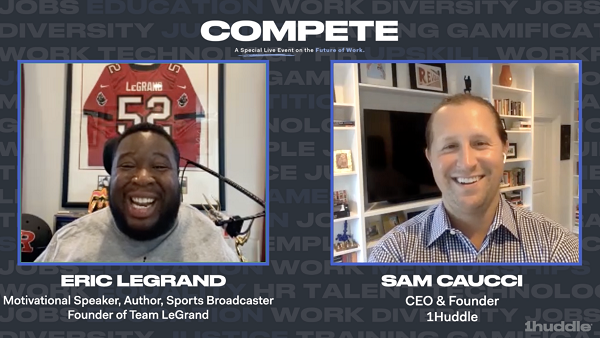
There has been much more talk about diversity and inclusion, he noted. “That’s what I’ve seen in the past five years. Diversity and inclusion programs are really coming into the workplace, which is amazing because there are so many people dealing with disabilities and six million Americans living with some form of paralysis,” he said.
“Connections are important. They are a part of making inroads and generating inclusion, said LeGrand. “I tell students, ‘I am just like you.’ I sat in those high school seats before. I listened to presentations, and I’ve played college football. And now, I’m in the working world. I’m not that different than you. I had one second that changed my life and made my life different than yours.”
His hopes for the future of work include more compassionate leadership, diversity and inclusion.
NJEDA Responds
Tim Sullivan, CEO of the New Jersey Economic Development Authority (NJEDA), said, “Industries that are most dislocated now are restaurants and retailers. We are looking at tens of thousands or more people facing an unattractive set of circumstances here. How do we connect those folks with the training they need or information they need to find new and different work in the period before restaurants and retailers go back to something like normal?
“Technology training will have to play a huge part in that,” Sullivan said.
“In a normally really bad recession, you would open up job-training centers and partner with community colleges and fill up gymnasiums with folks with laptops to find out what skills they need,” he said. But that is impossible right now, with social-distancing requirements preventing those gatherings.
Sullivan also noted that there is a lack of venture capital for Black and Latinx businesses, and that’s prompted the state to dedicate seed money to them.
“We are trying to put our money where our mouth is. If we are serious about addressing not just the wage and employment gaps, which are some of the most pernicious wage and employment gaps in America,” the NJEDA will also need to address the wealth gap in the Black and Latinx community, Sullivan said.
“A survey by Diversity VC and RateMyInvestor found that, nationwide, less than 1 percent of all venture capital investments go to Black-owned firms, and less than 2 percent of investments go to Latinx-owned companies,” he said.
“The Authority just finished gathering information, seeking input on ways to increase access to capital for Black- and Latinx-led startups,” he said.
Sullivan noted that the NJEDA “sought ideas from a diverse range of stakeholders, including fund managers, angel investors, venture capitalists, small-business owners, researchers and practitioners involved in entrepreneurship work, industry and trade groups, and other states’ governments.
“The Authority sought to address Black and Latinx businesses’ needs and solicit suggestions for how to best structure solutions, including attracting existing seed funds to New Jersey or creating a new seed fund with a specific focus on such businesses,” he said.
“One potential solution the Authority is considering is a diversity seed fund that would focus on driving capital to Black- and Latinx-owned enterprises,” Sullivan said.
Caucci said, “It is everybody’s responsibility to create a workforce where everybody can compete, including our elected officials, talent leaders, teachers and C-level leaders. Corporations and education need to more than ever be talking to make sure we are preparing our young people for the jobs of today,” he said.
“Inequities in society are clearly present at work, as well; and I am hopeful because of the dialogue and willingness to address these issues that are happening [on the part of] many leaders in our workforce. It can stop,” he said.
“Access is critical to creating a workforce that can compete,” he said. “And technology can play a major positive role here.”

